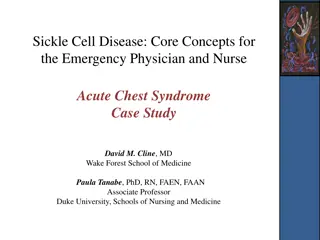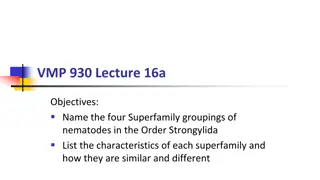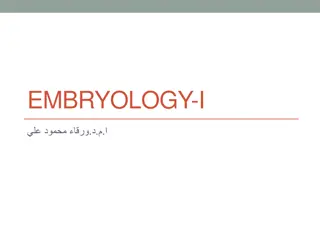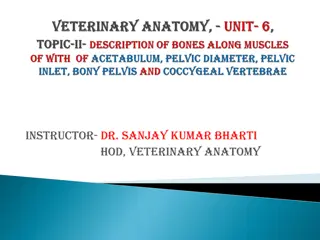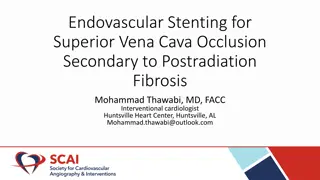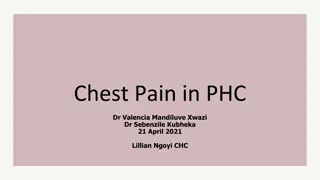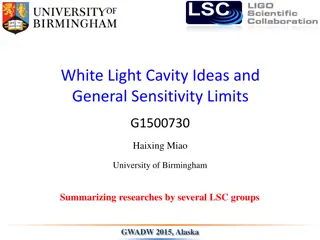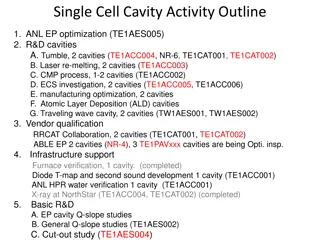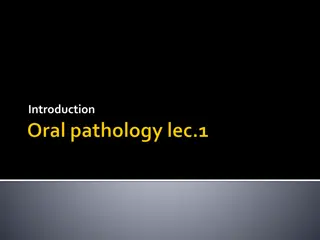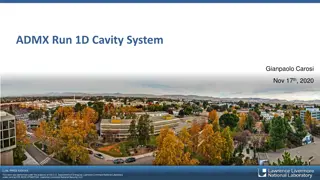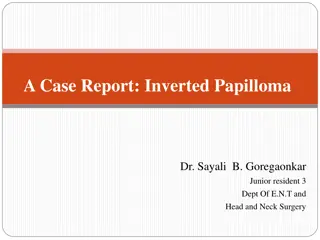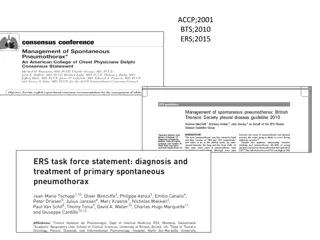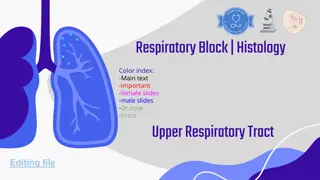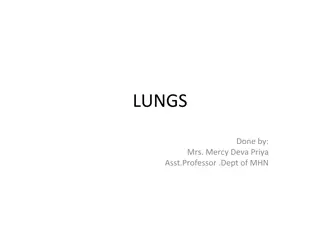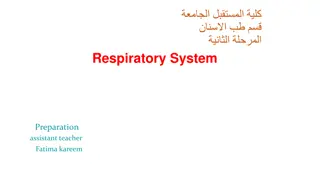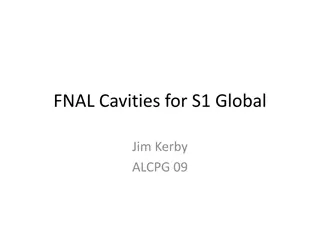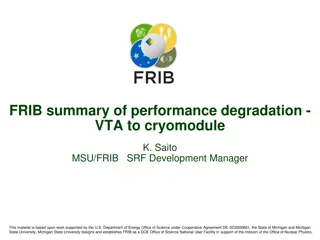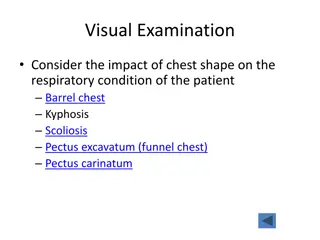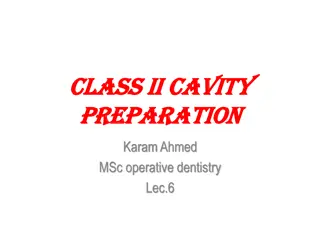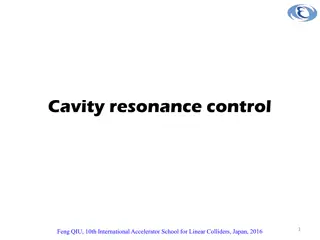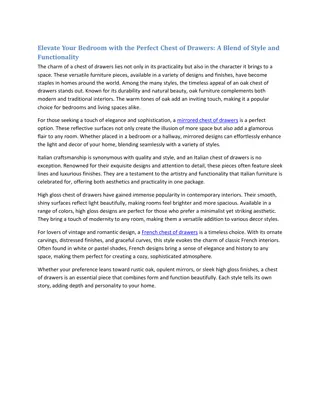FPC & HOM Technology Challenges, FCC
The challenges and technology involved in coupling beam power out of the cavity and coupling RF power into the cavity for the Future Circular Collider (FCC). It also covers the RF layout for the FCC-ee, basic parameters for proton and electron beams, accelerating RF in the LHC, input couplers, and p
0 views • 36 slides
Chest Imaging Interpretation for Tuberculosis Screening
Chest imaging plays a crucial role in screening for pulmonary tuberculosis (TB). This activity, led by Dana Kissner from Wayne State University Detroit Tuberculosis Clinic, focuses on interpreting chest imaging results to aid in the diagnosis and management of TB cases. The content includes informat
3 views • 22 slides
Pediatric Trauma Resources: Chest, Abdomen, and Pelvis Review
This guideline provides resources for the evaluation and management of chest, abdomen, and pelvic trauma in pediatric patients. It covers a range of topics including thoracic injuries, abdominal trauma evaluation, nonoperative management protocols, and guidelines for various pediatric injuries. The
5 views • 21 slides
Managing Acute Chest Syndrome in Sickle Cell Disease
A case study of a 31-year-old male with sickle cell disease presenting in the emergency department with a pain crisis. The patient has a history of avascular necrosis, priapism, NSTEMI, cholecystectomy, and previous acute chest syndrome. Explore the patient's symptoms, past medical history, and reco
7 views • 19 slides
Bone inlay chest of drawers
Lakecity Handicrafts presents a mesmerizing fusion of tradition and sophistication with their exquisite bone inlay chest of drawers. Each piece is a monument to the artistry and expertise of their master craftsmen, as they have been meticulously crafted to every last detail.
0 views • 2 slides
Advanced Cryomodule Technology for China's Spallation Neutron Source Upgrade
This article discusses the development of a Double-Spoke Cavity Cryomodule for the China Spallation Neutron Source (CSNS) project. It covers the structure of the cryomodule, integration processes, future work, and details about the CSNS beam parameters and upgrade scheme. The content includes images
0 views • 19 slides
Clinical Protocols for Chest Pain Management
This presentation covers key aspects of managing chest pain cases, including focused assessments, implementing protocols, responding to cardiac arrest, and facilitating effective communication. It discusses the importance of VHA Directive 1177 and various guidelines to improve patient outcomes in ac
0 views • 12 slides
Overview of Superfamilies in Order Strongylida Nematodes
The Order Strongylida in nematodes encompasses four main superfamilies - Trichostrongyloidea, Strongyloidea, Ancylostomoidea, and Metastrongyloidea. Each superfamily is defined by distinct characteristics such as buccal cavity size and location within the host, as well as differences in life cycle a
1 views • 34 slides
Development of Human Face and Oral Cavity in Embryology
The process of embryonic development involves the formation of the human face and oral cavity from the morula stage onwards. Key structures such as the primitive streak play a vital role in establishing bilateral symmetry, initiating germ layer formation, and guiding gastrulation. The differentiatio
2 views • 32 slides
Veterinary Anatomy Overview: Pelvic Cavity and Bony Pelvis Structures
The instructor, Dr. Sanjay Kumar Bharti, explains the acetabulum, obturator foramen, sexual differences, and characteristics of sheep and goats related to pelvic anatomy. Details include the structure of the acetabulum, the large obturator foramen, pelvic cavity, and differences between male and fem
2 views • 18 slides
Anatomy of the Upper Limb: Clavicle, Scapula, Humerus
The upper limb anatomy includes detailed descriptions of the clavicle, scapula, and humerus bones. The clavicle is a long bone that articulates with the sternum and scapula, while the scapula lies on the posterior chest wall and has important bony landmarks like the acromion and glenoid cavity. The
2 views • 15 slides
Endovascular Stenting for Superior Vena Cava Occlusion: A Case Study
Superior Vena Cava (SVC) occlusion secondary to postradiation fibrosis is a rare condition that can lead to debilitating symptoms. In this case study, a 47-year-old male with a history of Hodgkin lymphoma treated with chest radiotherapy presented with exertional chest pain and other associated sympt
1 views • 19 slides
Understanding Chest Pain Management at Primary Healthcare Level
Chest pain is a common presentation requiring swift identification and management to distinguish life-threatening causes like Myocardial Infarction. This article focuses on the approach to chest pain at a primary healthcare level, detailing cardiac and non-cardiac causes, recognizing urgent cases, a
2 views • 52 slides
Advances in White Light Cavity for Sensitivity and Bandwidth Optimization
The research discusses innovative ideas for enhancing sensitivity and bandwidth limits in the context of white light cavity technologies. It explores methods such as external/internal squeezing and signal recycling to surpass existing Mizuno Limits, shedding light on crucial issues for future upgrad
0 views • 27 slides
Understanding the Connection Between Oral Health and Systemic Diseases
The relationship between oral health and systemic diseases is significant, with manifestations within the oral cavity providing clues to underlying systemic issues. Disease processes involve aspects like etiology, pathogenesis, morphologic changes, and clinical significance. Organisms and toxins spr
0 views • 19 slides
Understanding Magnetic Shielding Considerations for 3.9 GHz Cavities
This document discusses Q and magnetic shielding considerations for 3.9 GHz cavities used in the LCLS-II project, highlighting the unique behavior observed in nitrogen-treated cavities. The study delves into the improved Q values and field dependence of quality factors, challenging traditional niobi
0 views • 10 slides
Magnetic Field Suppression and Cavity Frequency Control in SRF Development at FRIB
This material discusses the techniques used at the Facility for Rare Isotope Beams (FRIB) to suppress magnetic fields and control cavity frequencies. It covers topics such as remnant field suppression, solenoid package design, validation tests, and magnetic shield material validation for the FRIB cr
0 views • 14 slides
Single Cell Cavity Activity Overview
The Single Cell Cavity Activity includes ANL EP optimization, R&D cavities for various processes such as tumble, laser re-melting, CMP, ECS investigation, and manufacturing optimization. There are also activities related to Atomic Layer Deposition (ALD) cavities, traveling wave cavities, vendor qual
0 views • 4 slides
Understanding the Anatomy of the Oral Cavity
The oral cavity extends from the lips to the hard and soft palate and houses various structures like the tongue, buccal mucosa, floor of the mouth, hard palate, gingiva, and lips. This detailed overview covers the different regions of the tongue, mucosal linings, salivary glands, and palatal structu
0 views • 27 slides
Key Upgrades for Cavity 1D in ADMX Experiment
The ADMX experiment at LLNL is undergoing key upgrades for Cavity 1D to enhance axion-to-photon conversion power. The upgrades aim to optimize frequency coverage, form-factor, and Q-factor, with a focus on improving physical and noise temperature. Replacing stainless steel with carbon fiber support
0 views • 11 slides
Case Presentation: Kartagener Syndrome in a 24-Year-Old Male
24-year-old male patient with a history of asthma and bronchiectasis presents with worsening shortness of breath and chest pain. Neonatal history reveals Situs inversus and dextrocardia, recurrent upper and lower respiratory tract infections, while childhood history includes asthma diagnosis and chr
0 views • 24 slides
Recognizing Serious Symptoms During Pregnancy
Learn about the symptoms that are considered normal during pregnancy and when you should be alarmed, such as chest pain, severe chest or back pain, breathlessness, anxiety, and palpitations. This guide highlights specific scenarios and risk factors that require urgent medical attention to ensure the
0 views • 18 slides
Anatomy and Physiology of the Throat: A Comprehensive Overview
The throat, comprising the mouth, pharynx, and associated structures, plays vital roles in digestion, communication, and breathing. Understanding the anatomy and physiology of the throat, from the oral cavity to the laryngopharynx, helps in comprehending functions like swallowing, sound production,
0 views • 15 slides
Inverted Papilloma Case Report and Diagnosis
A 62-year-old male presented with a mass in the right nasal cavity causing obstruction and headache. No history of URTI or allergies. Local examination revealed a pinkish mass with possible differential diagnosis of Antrochoanal Polyp, Ethmoidal polyposis, or Inverted Papilloma. Nasal endoscopy show
0 views • 24 slides
Management of Pneumothorax in Adult Males: Clinical Scenarios and Recommendations
In this medical case study, two scenarios of adult males presenting with pleuritic chest pain and pneumothorax are discussed. The first scenario involves a 25-year-old with sudden onset chest pain, while the second scenario involves a 60-year-old with COPD. Recommendations for managing pneumothorax,
0 views • 26 slides
Understanding Microbial Ecology in the Oral Cavity
The oral cavity is a unique ecological system that plays host to a diverse resident microflora, consisting of various bacterial species, yeasts, and other microorganisms. This dynamic microbial community interacts with the human body, contributing to its normal development and defense systems. The c
0 views • 36 slides
Understanding Nasal Cavity Histology and Respiratory Structures
The detailed information provided covers the histological structures of the nasal cavity, including the vestibule, respiratory mucosa, nasal septum, olfactory mucosa, and paranasal sinuses. It also delves into the microscopic structures of the wall of the trachea and primary bronchi. The respiratory
0 views • 11 slides
Understanding the Anatomy of Lungs
The lungs, vital organs of the respiratory system, consist of two cone-shaped structures with apex, base, costal, and medial surfaces. Positioned in the thoracic cavity, they are associated with the heart, great vessels, and other structures in the mediastinum. The right lung has three lobes, while
0 views • 16 slides
Understanding the Respiratory System: Lesson Objectives and Anatomy Explained
Explore the intricacies of the respiratory system as you delve into the lesson objectives and anatomy presented by Assistant Teacher Fatima Kareem. Discover the parts of the respiratory system, from the nose to the lungs, and learn how air travels through this vital system to facilitate breathing an
0 views • 10 slides
Heart Score for Improved Risk Stratification in Patients with Chest Pain
Heart Score is a valuable tool for stratifying patients with chest pain in the emergency setting, aiding in clinical decision-making. This algorithm helps differentiate causes of thoracic pain effectively, minimizing false negatives and reducing unnecessary hospital admissions. By assessing factors
0 views • 30 slides
Quality Control and Testing Procedures for Superconducting Radiofrequency Cavities
The presentation highlights the rigorous processes involved in qualifying superconducting radiofrequency (SRF) cavities for high-performance applications. Each cavity undergoes a detailed qualification process, including BCP treatment, electropolishing, and high-pressure rinsing, to ensure optimal p
0 views • 18 slides
Clinical Cases and Diagnostic Imaging Analysis in Emergency Medicine
This content delves into multiple clinical cases captured through diagnostic imaging, highlighting the patient presentations, radiological findings, potential diagnoses, and recommended treatments. The cases cover scenarios such as shoulder injuries, chest pain with associated symptoms, hip pain in
0 views • 19 slides
FNAL Global S1 Cavity Plan and Shipment Details
The content discusses the progress and plans related to FNAL Cavities for the S1 Global project. It covers topics such as major components, cavity processing challenges, the developed working plan, and details of cavity shipment to KEK. Various images of cavity plans and processing are included alon
0 views • 17 slides
Understanding the HEART Score for Risk Stratification in Patients with Chest Pain
The HEART score is a valuable tool for stratifying patients presenting with chest pain in the emergency department. It helps in distinguishing between low, intermediate, and high-risk individuals and guides further management decisions. By incorporating factors like history, ECG findings, age, risk
0 views • 30 slides
Advancements in Superconducting Linear Colliders for ILC Energy Upgrades
Discussion on higher gradient expectations for SRF at the International Linear Collider (ILC) for energy upgrades beyond 3 TeV, highlighting advancements in single and multi-cell cavity gradients over three decades. Promising R&D paths include cold electropolishing, nitrogen infusion, advanced cavit
0 views • 15 slides
Performance Degradation Summary for FRIB Cryomodule VT vs. Bunker
FRIB's performance degradation analysis focuses on validating the design of the cryomodule, with tests conducted under various operational conditions to assess parameters such as cryogenic losses, SRF subsystems performance, and cavity dynamics. The ReA6-1 cavity's performance, measured in terms of
0 views • 5 slides
Comprehensive Visual and Physical Assessment Techniques for Respiratory Conditions
This comprehensive guide covers the visual, palpation, auscultation, percussion, and pathological processes involved in assessing respiratory conditions. It discusses the impact of chest shape variations like barrel chest, kyphosis, scoliosis, pectus excavatum, and pectus carinatum on respiratory he
0 views • 6 slides
Class II Cavity Preparation in Operative Dentistry
Class II cavity preparation in operative dentistry involves several key steps like occlusal outline form, proximal outline form, and resistance form. It aims to remove caries and faults while conserving tooth structure and providing sufficient support for restorative material like amalgam. Proper ou
0 views • 19 slides
Cavity Resonance Control in Linear Colliders: An Overview
Feng QIU discusses cavity resonance control techniques for Linear Colliders in this presentation. Topics include cavity voltage, phase, piezoelectric control, and stabilization of the RF field to optimize performance. The content emphasizes the importance of managing cavity resonances effectively to
0 views • 21 slides
Elevate Your Bedroom with the Perfect Chest of Drawers: A Blend of Style and Fun
The charm of a chest of drawers lies not only in its practicality but also in the character it brings to a space. These versatile furniture pieces, available in a variety of designs and finishes, have become staples in homes around the world. Among t
0 views • 1 slides



